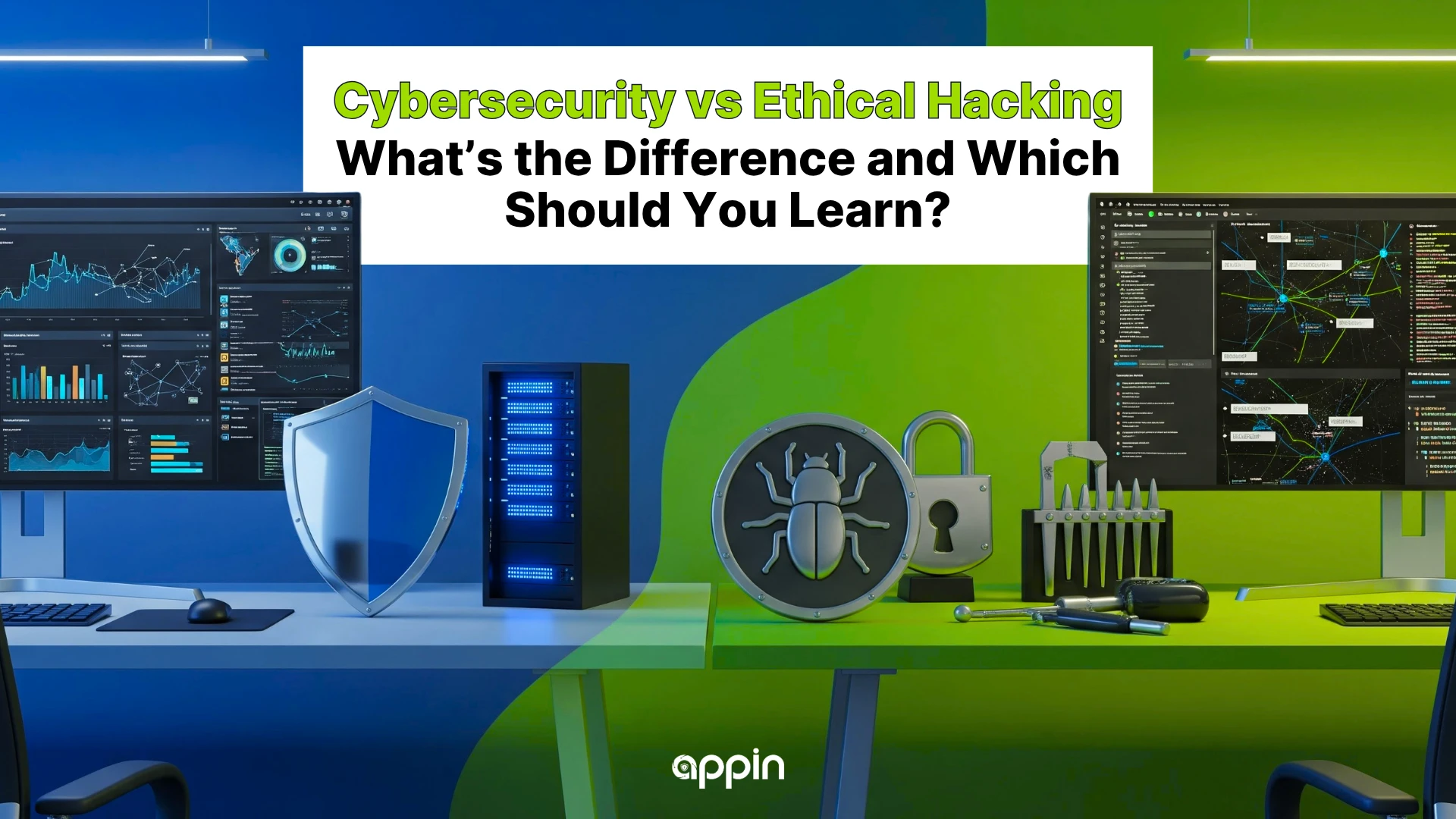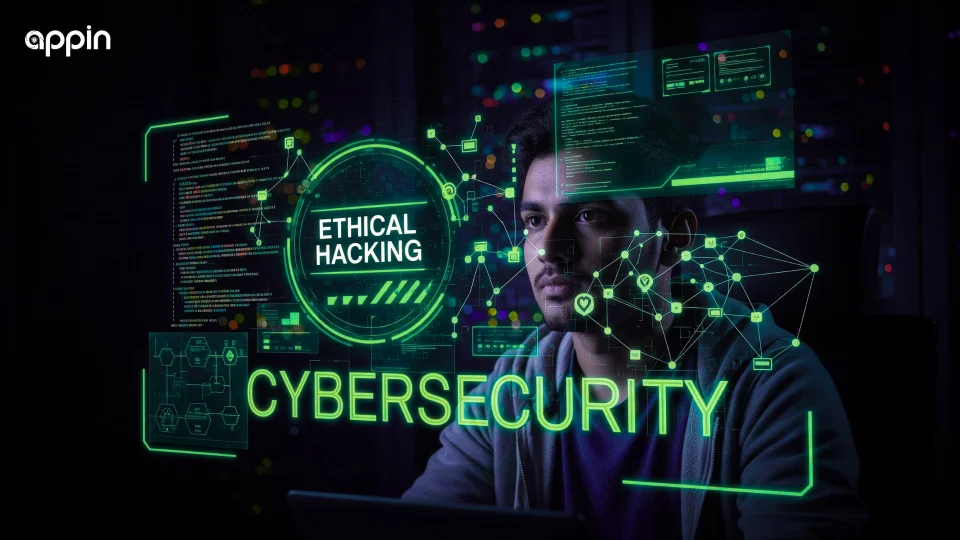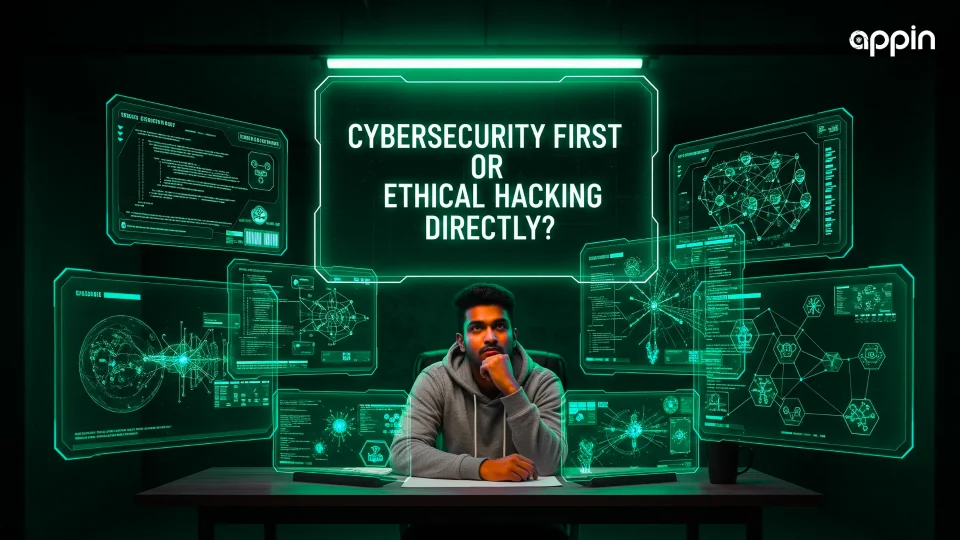Why are students confused between cybersecurity and ethical hacking?
Many students are confused about cybersecurity vs ethical hacking, thinking these terms mean the same thing or not understanding which field to pursue. The confusion is understandable because both involve protecting systems and careers in security, but they’re actually quite different paths with different responsibilities.
Most fresh graduates hear both terms used interchangeably online and don’t realize they represent different career specializations. One student might spend months pursuing the wrong training because they didn’t understand what each field actually involves. This delay wastes time and money when you could be building the right skills from the start.
The good news is that understanding the difference is straightforward once you look at actual job responsibilities, daily tasks, and career focus. This guide breaks down exactly what cybersecurity professionals do versus what ethical hackers do. You’ll see which field matches your interests, skills, and career goals.
By the end, you’ll know whether to pursue general cybersecurity training or specialize in ethical hacking. You might even discover that combining both creates your ideal career path. Let’s clear up the confusion.
What is the main difference between cybersecurity and ethical hacking?
Cybersecurity is the broader protective field covering all measures to defend information systems, while ethical hacking is a specialized skill focused specifically on authorized penetration testing and vulnerability discovery. Think of cybersecurity as a complete umbrella and ethical hacking as one important tool under it.
Cybersecurity encompasses many specializations:
- Network security protecting infrastructure
- Data protection and privacy compliance
- Security policy development and management
- Incident response and threat investigation
- Security operations and monitoring
- Risk assessment and governance
Ethical hacking focuses narrowly on one critical task: finding security weaknesses before attackers do.
The difference between cybersecurity and ethical hacking becomes clearer when you look at scope. A cybersecurity professional might spend their day managing firewalls, ensuring compliance policies are followed, investigating security breaches, or developing security strategies. An ethical hacker conducts authorized penetration tests, tries to break into systems legally, and documents vulnerabilities.
Cybersecurity is a comprehensive career field with many different roles and specializations. Ethical hacking is one specialized skill within that broader field. Every ethical hacker needs cybersecurity knowledge, but not every cybersecurity professional performs penetration testing.
The relationship matters for career planning. Many professionals start with cybersecurity fundamentals, then specialize in ethical hacking. Others work in cybersecurity without ever focusing on penetration testing. Both paths are valid, but understanding which resonates with you determines your training approach.
What does a cybersecurity professional actually do?
Cybersecurity professionals protect organizational information systems and data from cyber threats, attacks, and unauthorized access through multiple approaches and strategies. They work across many domains beyond just testing systems.
Here are typical daily responsibilities:
- Monitor networks and systems for suspicious activity
- Develop and enforce security policies
- Manage user access controls and permissions
- Install and maintain security tools and firewalls
- Conduct security awareness training for employees
- Investigate security incidents and breaches
- Ensure compliance with industry regulations
- Plan and implement security upgrades
The scope of cyber security jobs is surprisingly broad. Some professionals focus on network protection. Others specialize in data privacy or compliance. Some manage security teams. Others work in incident response, handling active breaches and emergencies.
Career paths in cybersecurity include various specializations. Security analysts monitor threat activity. Security architects design protective systems. Compliance officers ensure regulatory adherence. Incident responders handle active attacks. Each role requires cybersecurity knowledge but focuses on different areas.
The daily work involves both technical and administrative tasks. A cyber security jobs professional might spend part of their day reviewing logs, part of it in meetings discussing security strategy, and part of it configuring systems. Some roles are highly technical. Others involve more management and policy work.
This diversity makes cybersecurity attractive. You can choose specializations matching your interests. If you prefer hands-on technical work, incident response or security engineering suit you. If you like strategy and planning, security architecture or governance might fit better.
To start your cybersecurity career, explore cybersecurity certification programs that teach foundational knowledge across multiple specializations.
What does an ethical hacker specifically do?
Ethical hackers conduct authorized penetration tests and security assessments to find vulnerabilities before attackers discover and exploit them. Their primary focus is hands-on technical testing, using authorized methods to break into systems legally.
Here are typical ethical hacker responsibilities:
- Perform authorized penetration tests on systems
- Conduct vulnerability assessments and scans
- Attempt to breach security defenses legally
- Document all vulnerabilities discovered
- Provide recommendations for remediation
- Perform social engineering tests
- Test network segmentation and controls
- Verify security controls work as intended
The daily work is technical and hands-on. An ethical hacker might spend the day attempting to exploit a company’s network, testing if their security holds up. They use actual hacking tools and techniques, just with written permission and specific scope limitations.
This specialization differs fundamentally from general cybersecurity work. While security professionals might manage firewalls and monitor alerts, ethical hackers actively try to penetrate those same systems. Their goal is to find weaknesses before attackers do.
Ethical hacking training teaches you specific methodologies, tools, and techniques. You learn step-by-step approaches to penetration testing, from reconnaissance through exploitation. The training emphasizes practical skills, not just theory.
Most ethical hackers work for companies testing their own systems or for consulting firms hired to test client infrastructure. Some become independent consultants. The role is growing because companies increasingly hire external penetration testers to find vulnerabilities.
This specialization requires technical depth, problem-solving skills, and persistent determination. If you enjoy hands-on technical challenges and direct problem-solving, certified ethical hacking training provides the exact skills you need.
Is ethical hacking a subset of cybersecurity or a completely different field?
Ethical hacking is a specialized skill within the broader cybersecurity field, not a completely separate profession. All ethical hackers need cybersecurity knowledge, but not all cybersecurity professionals are penetration testers. The relationship is hierarchical and complementary.
Think of it this way. Cybersecurity is the parent field with many specializations. Ethical hacking is one specific specialization within that parent. Other specializations include network security, data protection, compliance, incident response, and security operations.
The cybersecurity vs ethical hacking distinction matters because it affects your learning path. Someone pursuing cybersecurity might never specialize in penetration testing. Someone pursuing ethical hacking must first understand cybersecurity fundamentals to succeed at penetration testing.
Here’s why ethical hackers need cybersecurity knowledge:
- Understanding network architecture helps identify testing targets
- Knowing security controls reveals what defenses to test against
- Security policy knowledge informs testing scope and limitations
- Incident response knowledge helps document findings properly
- Compliance understanding ensures testing stays legal and authorized
The career progression often moves one direction. Many ethical hackers started in general cybersecurity roles, then specialized in penetration testing. Starting directly in ethical hacking without foundational cybersecurity knowledge is possible but challenging.
This relationship creates opportunity. You can start with broad cybersecurity training, explore different specializations, then move into ethical hacking if you find it interesting. Or you can target ethical hacking specifically from the start with proper foundations.
Understanding this hierarchy helps you plan your training and career progression strategically.
Which career has better salary prospects, cybersecurity or ethical hacking?
Entry-level ethical hackers typically earn 10-15% more than entry-level cybersecurity professionals due to specialized skills being in high demand, but both fields offer excellent earning potential and salary growth. Career progression depends more on experience and certifications than the specific specialization.
Here’s realistic salary data for India:
- Entry-level cybersecurity: ₹4-7 lakhs annually
- Entry-level ethical hacking: ₹5-8 lakhs annually
- Mid-level cybersecurity: ₹8-12 lakhs annually
- Mid-level ethical hacking: ₹9-13 lakhs annually
- Senior-level both fields: ₹15-25 lakhs annually
The salary difference at entry level reflects specialization premium. Penetration testers require deeper technical skills, so companies pay more. However, the gap narrows as you advance.
Cyber security salary growth is solid. Professionals with 3-5 years of experience see significant increases. Advanced certifications boost earning power substantially. Senior roles and management positions exceed 20+ lakhs annually.
Ethical hacking salary follows similar patterns. The initial premium continues through mid-level roles, but top earners exist in both fields. A highly experienced security architect might earn more than an ethical hacker, or vice versa, depending on specialization and employer.
Geographic location affects earnings. Bangalore, Mumbai, and Delhi offer higher salaries than Indore or Tier 2 cities. Multinational companies typically pay more than local firms. Consulting roles often pay more than corporate positions.
Certifications significantly impact cyber security salary across both fields. Certified professionals earn 20-30% more than uncertified peers. Advanced certifications like CISSP, OSCP, or CCSK command premium salaries.
The earning potential is strong in both specializations. Choose based on interest and skill fit, not just salary differences.
Which field has more job opportunities in India?
Cybersecurity roles are more abundant overall because organizations need multiple security professionals across different specializations, but ethical hacking positions are fewer and highly sought-after by skilled candidates. The job market is stronger for general cybersecurity, but penetration testing roles command significant attention.
Here’s what the market looks like:
- Cybersecurity positions: High volume across all cities
- Ethical hacking roles: Lower volume but growing rapidly
- Entry-level opportunities: Better in general cybersecurity
- Specialized roles: More plentiful for penetration testers
The reason for this distribution is clear. Every organization needs multiple cybersecurity professionals across different functions. They need network security people, compliance specialists, incident responders, and security analysts simultaneously. Ethical hackers are needed less frequently because not every company has active penetration testing programs.
Cyber security jobs are available in banking, healthcare, e-commerce, government, IT services, and manufacturing. Nearly every industry hires security professionals. This creates job security and numerous opportunities.
Ethical hacking roles exist but are more selective. Consulting firms, larger corporations, and specialized security companies hire CEH certification holders regularly. Startups and smaller companies less commonly have dedicated penetration testing teams.
However, ethical hacking positions often pay more and require less competitive interview processes. Companies actively seeking penetration testers have more difficulty finding qualified candidates, so they hire faster and negotiate more favorably.
Job opportunities favor cybersecurity in volume but ethical hacking in attention level. If you want maximum job options, pursue general cybersecurity. If you want specialized, premium positions, focus on CEH v13 AI-powered course training for penetration testing.
Both fields offer strong career prospects right now. Choose based on your interests, not job availability.
Should you learn cybersecurity first or start directly with ethical hacking?
Starting with cybersecurity fundamentals is strongly recommended because it provides necessary foundation knowledge that penetration testing courses assume you already understand. Most ethical hacking courses expect you to know networking, operating systems, and security principles. Building strong foundations first makes advanced training significantly more effective.
Here’s why prerequisites matter:
- Penetration testing requires understanding network architecture
- Vulnerability exploitation demands systems knowledge
- Security tool usage requires foundational security concepts
- Testing methodologies assume security principle understanding
- Advanced techniques build on basic security knowledge
Starting with cyber security course fundamentals puts you on solid ground. You learn how security actually works before trying to break it. When you later move to penetration testing, concepts click instantly because you have context.
Many students try starting with ethical hacking directly and struggle. They encounter networking terms they don’t understand, security concepts they haven’t learned, and tool usage that confuses them. This frustration slows learning and sometimes leads to quitting.
The recommended learning path looks like this:
- Complete foundational cybersecurity certification programs covering networking, systems, and security basics
- Gain experience in entry-level security roles or studies
- Specialize with ethical hacking or penetration testing training
- Earn penetration tester certifications like CEH or OSCP
This sequence takes 6-12 months but results in stronger skills and faster job placement. Many employers also prefer candidates who have both foundational and specialized knowledge.
The alternative is learning both simultaneously. Some training programs teach cybersecurity fundamentals while introducing penetration testing gradually. This works if you can handle the increased complexity.
Can you pursue and learn both cybersecurity and ethical hacking?
Yes, most professional security experts do pursue both fields because the skills complement perfectly, making you significantly more valuable to employers and opening multiple career options. Many professionals start with cybersecurity fundamentals, then specialize in ethical hacking through advanced training.
The skills overlap meaningfully:
- Network security knowledge enhances penetration testing
- Incident response skills help document findings
- Security operations understanding informs testing methodology
- Compliance knowledge ensures proper testing scope
- Defensive knowledge improves offensive testing
Learning both cybersecurity vs ethical hacking specializations is actually the optimal career approach. You become more marketable and flexible. Companies prefer employees with broad security knowledge and specialized penetration testing skills.
Here’s how professionals typically combine both:
- Phase 1: Complete cybersecurity fundamentals and earn entry-level certifications
- Phase 2: Work in cybersecurity roles gaining practical experience
- Phase 3: Specialize in ethical hacking through advanced training
- Phase 4: Balance work between general security and penetration testing
This progression creates career resilience. You’re comfortable in general security roles and specialized in penetration testing. Job options multiply because you can apply for both positions.
Many Appin graduates follow this path. They start with bug bounty programs training alongside cybersecurity fundamentals. They gain experience in security roles, then specialize in penetration testing and bug bounty work. This combination makes them highly sought-after by employers.
The time investment is worthwhile. You might spend 12-18 months learning both thoroughly, but you’ll earn more, have more job options, and enjoy your career more because you have diverse skills.
Which one should you choose based on your personal interests and goals?
Choose ethical hacking if you enjoy hands-on technical challenges, problem-solving through direct testing, and working independently on complex security problems. Choose broader cybersecurity if you prefer strategic thinking, policy development, incident response, or managing teams and security operations.
Here are personality and interest factors to consider:
Choose Ethical Hacking If You:
- Enjoy solving technical puzzles and challenges
- Like working independently on projects
- Prefer hands-on testing over policy work
- Get excited about discovering vulnerabilities
- Want clear technical metrics for success
- Enjoy learning new tools and techniques
Choose Cybersecurity If You:
- Prefer working as part of larger teams
- Like strategic planning and policy development
- Enjoy variety across different roles
- Care about compliance and governance
- Want broader career options
- Prefer business-oriented security thinking
Your learning preference also matters. Ethical hacking training is deeply technical and tool-focused. Cybersecurity training is broader, covering strategy, policy, and operations alongside technical content. If you prefer deep technical specialization, ethical hacking fits better. If you prefer diverse knowledge, cybersecurity suits you.
Consider your work environment preference too. Ethical hackers might work independently testing systems or in consulting firms. Cybersecurity professionals work across diverse environments from startups to enterprises in every industry.
Both careers are rewarding and pay well. Neither choice is wrong. The key is choosing based on genuine interest and personality fit. When you enjoy your work, you excel at it and build a fulfilling career.
Talk to professionals in both fields. Take trial courses. Explore internships or entry-level positions. Your personal experience will reveal which direction resonates with you.
CONCLUSION
The core difference is clear: cybersecurity is the broad protective field with many specializations, while ethical hacking is a specific penetration testing skill within that field. Understanding this distinction helps you plan your career strategically.
Both offer excellent prospects in India. Cybersecurity has more total job opportunities. Ethical hacking offers specialized, premium positions. Both provide strong salaries and growth potential.
The ideal approach combines both. Start with cybersecurity fundamentals, then specialize in ethical hacking if penetration testing excites you. This creates career flexibility and maximizes your market value.
Ready to start your journey? Appin offers comprehensive cybersecurity and ethical hacking training with hands-on labs, expert mentorship, and genuine placement support. Whether you’re choosing between the fields or planning to learn both, we have programs designed for your success.
Explore our courses, book a free consultation with our career counselors today.





